Your Mama: A Conversation with
NoNieqa Ramos and Jacqueline Alcántara
 March 11th, 2021 by jules
March 11th, 2021 by jules
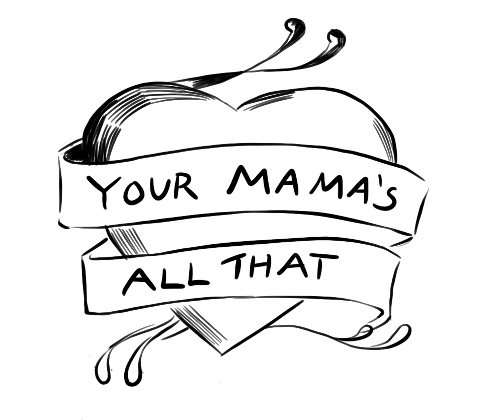
As you can read below in today’s 7-Imp visit with author NoNieqa Ramos and illustrator Jacqueline Alcántara, Your Mama (Houghton Mifflin Harcourt) — on shelves next month — sprung to life when Ramos decided to “approach a trope with a fresh perspective.” In this case, that trope is the tried-and-true “yo’ mama” joke, often used to disparage someone and their mother. Here, Ramos and Alcántara turn that joke on its head and pay tribute to mothers everywhere — in particular, an independent, brown-skinned, single Latinx mother who is all. that. And then some.
She’s also “EV-ER-RY-THANG.” That alone gives you a sense of the book’s text, which bursts out of the gate with style and rhythm. Alcántara’s illustrations incorporate a tattoo motif and depict a daughter who reveres her sweet, strong “brainiac” mother.
Both NoNieqa and Jacqueline visit 7-Imp today to talk about the book, and Jacqueline shares some process photos as well. (Pictured above is a portion of one of Jacqueline’s early sketches.) I thank them for visiting.
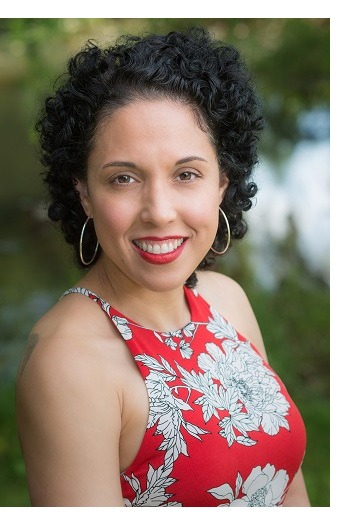 Jules: Can you talk about how you landed on the premise for this book, this notion of taking the “yo’ mama” joke and turning it on its head — and when you knew it could be a picture book?
Jules: Can you talk about how you landed on the premise for this book, this notion of taking the “yo’ mama” joke and turning it on its head — and when you knew it could be a picture book?
NoNieqa (pictured left — photo credit: Roger Hammons Photography): My inspiration started with homework. On my office chalkboard, I scribbled myself the assignment to approach a trope with a fresh perspective. I let the idea float for a few weeks before it coasted over the German Shepherd, across the barbecue pit and Hot Wheels die-cast pedal cars, and into the rose garden of my childhood. I thought, what if, what if I could flip the script of yo’ mama jokes?
But first, let me give credit where credit is due. While mama jokes have apparently existed since 1500 BCE, “yo’ mama” is universally recognized as an African American argumentative retort, referencing the “dozens.” According to the Urban Dictionary, the dozens, in its purest form, consists of “verbal sparring … and signifyin’, intended to defuse conflict amicably. … The dozens is a contest of personal power — of wit, self-control, verbal ability, mental agility and mental toughness.”
I was raised in the Bronx in Black and Latinx (nonBlack and AfroLatinx) culture and, specifically, in a Puerto Rican household — where humor, verbal agility, and mental toughness were valued. I grew up watching Saturday Night Live, In Living Color, and movies with Richard Pryor and Eddie Murphy. I hope Your Mama makes mamas laugh. Makes them feel seen. Helps them to know they don’t need permission to be tired. To rest. Your Mama always does her best.
I love that language is elastic, pliable, unpredictable. When I crafted the book, the jokes became a vehicle to honor the supreme dopeness of our mother figures. In my homage to the Latinx mamas of my childhood pushing against racist barriers, like a Giants lineman pushing a 1,700-pound sled, I aspire to honor their children with the same passion. They deserve it. They deserve everythang.
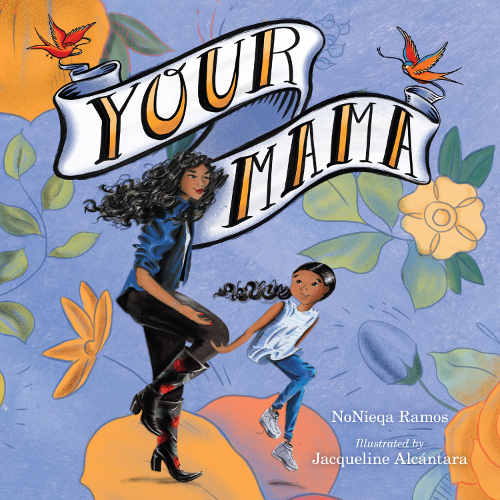
Jules: This is your picture book debut. What were the joys and challenges of writing in the picture book format?
NoNieqa: Writing picture books has been a childhood dream, since I attempted to sell them for a quarter a piece in my elementary school cafeteria — before the nuns shut me down. Picture books are portable theaters, allowing every child to carry art, poetry, and laughter to their treehouses, their stoops, their beds, their dreams.
I struggled to decide whether Your Mama should be written with a traditional narrative arc or as an ode. I experimented with both, and I think it’s so important for writers for children to step away for a second from the business of marketing and to play. So writers, fling words against the page like Jackson Pollock flung paint at a canvas. Scribble and spray paint them like Basquiat! Weave, die, tease, weld, burn, engrave!
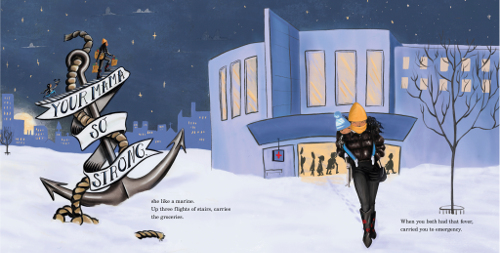
Up three flights of stairs, carries the groceries. …”
(Click spread to enlarge and read text in its entirety)
My joy radiated in composing the rhyme! I knew from studying “industry standards” and manuscript wish lists that my rhyme pushed boundaries. I definitely don’t write in iambic pentameter. I enjoy flexible rhyme scheme, and near rhyme is my passion. My mentor texts were a discography of all things — A Tribe Called Quest; Queen Latifiah’s “Ladies First”; LL Cool J’s “Mama Said Knock You Out” and “Rock the Bells”; and my primo Tony rapping Rob Base lyrics in front of his building in Co-Op City. Poetry, like music, is meant to be felt with the body and heard out loud.
Jules: What was it like for you to first see Jacqueline’s illustrations for this? Do you have a favorite spread? Do you have a favorite little detail in the book?
NoNieqa: It was like when the beat of “The Choice Is Yours” (Black Sheep) dropped at a prima’s family wedding and we all headed to the dance floor. Jackie’s illustrations captured the spirit, essence, and verve of my words. I want to frame every page. One of my favorite details is the way Jackie frames the opening lines at the beginning of each page in tattoo-inspired artwork. And don’t get me started on the fashion — the gold hoop earrings, the rose embroidered high-heeled boots, the ravishing gold-toned dress trailing her wake as Your Mama cat walks up the school steps.
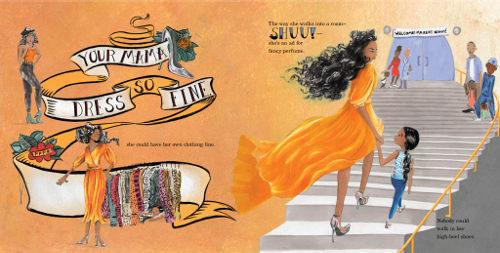
(Click spread to enlarge and read text in its entirety)
Jules: What does it mean to you to be published by Versify?
NoNieqa: The publication of my debut book has been a montage of dreams come true. I have been able to work with poet, educator, Newbery Award-winner, and rock star Kwame Alexander on his new imprint, Versify! I’ve witnessed the life-changing effect of his work with my middle-grade students, so it’s an immense honor to be part of his artistic mission to “change the world one word at a time.” And with groundbreaking works by authors like Lamar Giles, Kip Wilson, and Raúl the Third, they are doing it!
I will never forget my first phone call with Kwame on a lunch break in my middle school classroom. He said the magic words “Versify family” and “investment in my career.” Meeting in his writing studio to work on the structure, content, and cadence of Beauty Woke [coming in 2022] will always reign supreme in my memory. I am so grateful for the devotion and care my first editor, Erika Turner, and the Versify team took to match me and Jackie together for Your Mama.
Jules: I love the way this text flows.
NoNieqa: Thank you so much!
Jules: This is probably the first picture book I’ve seen with a mad dap and an “EV-ER-RY-THANG.” And it includes both English and Spanish. Was this a text that flowed quickly from you?
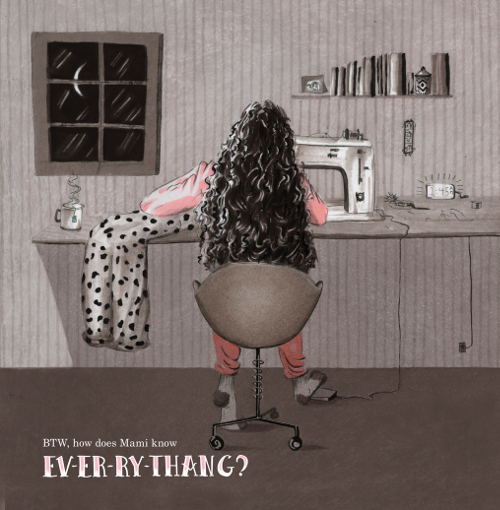
NoNieqa: Once I chiseled away the clutter, the verse rippled through me. I love how picture book author-llustrator Isabella Kung (No Fuzzball!) said Your Mama is a “symphony of slang.” Slang to me is poetry.
I do want to take this opportunity to add a couple of ideas to the discourse. Dr. Seuss’s tongue twisters and word creations are considered linguistic “genius.” In A.A. Milne’s Winnie-the-Pooh, excessive capitalization and frequent misspellings are considered quirky, endearing, and authentic. I thank Kwame, Margaret Raymo, Erica Turner, Weslie Turner, and the Versify team for recognizing my verse as rhythmic, quirky, authentic, and fun for mamas and children alike.
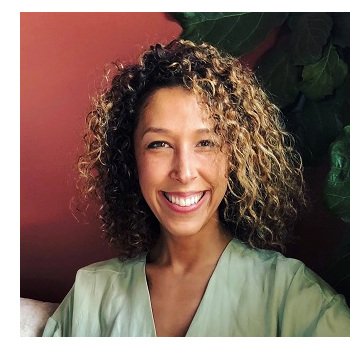 Jules: What was your initial response to NoNieqa’s text?
Jules: What was your initial response to NoNieqa’s text?
Jacqueline (pictured right — photo credit: Constance Kostrovski): My initial response was fun, funn, funnnnn!!!! I loved the energy, playfulness, and compassion that was shared between the two characters. It also left me with a lot of questions, which I love — because then I know there’s room for me to wonder and dream up a unique visual narrative.
Jules: Was it your idea to incorporate the tattoo imagery in the book?
Jacqueline: Yes! I was just dreaming and sketching and, at one point, thought about the old school “I love mom” tattoos. I drew a bunch of those and thought it would be fun to use tattoo-style banners for the “your mama” lines. Later on, it all clicked when I was thinking about the last page and the “#truth” line of text. I thought, yes, it’s a hashtag, but it also is a real motto for this mama, one that might just be tattooed onto her body! Then adding in the tattoo imagery actually made sense. I feel like it visually fits, even in the beginning of the book, but we build up to knowing why it’s there.
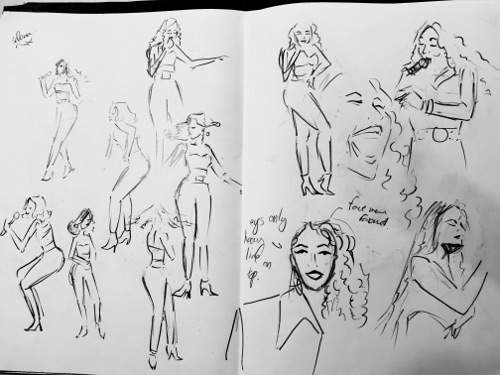
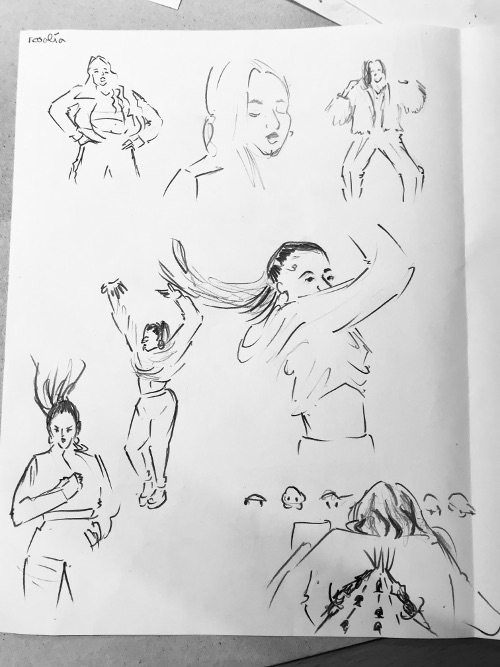
Selena and Rosalía performing
(Click each to enlarge)
Jules: What does it mean to you to be able to depict, as you do here, such a smart, multi-faceted, independent single mother?
Jacqueline: Ooooh. Well, this particular mama definitely has it going on! Single parents are straight up heroes, and rarely do we see them depicted in picture books. I took bits and pieces of my mom, aunts, grandmas, and other women I admire to add even more layers of amazing. But I tried to exaggerate it to show from the children’s perspective the admiration and awe we have for our moms. I loved that NoNieqa also showed friends, neighbors, relatives — the community that goes into raising kids.
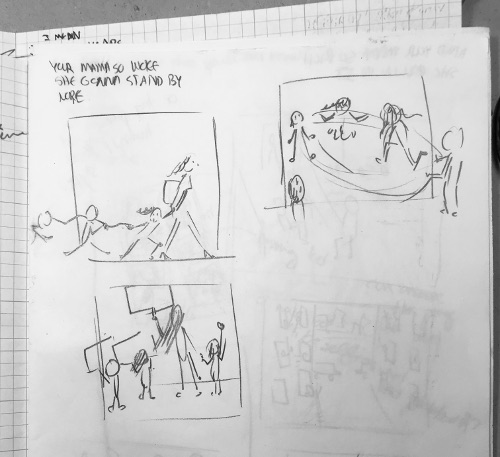
(Click to enlarge)
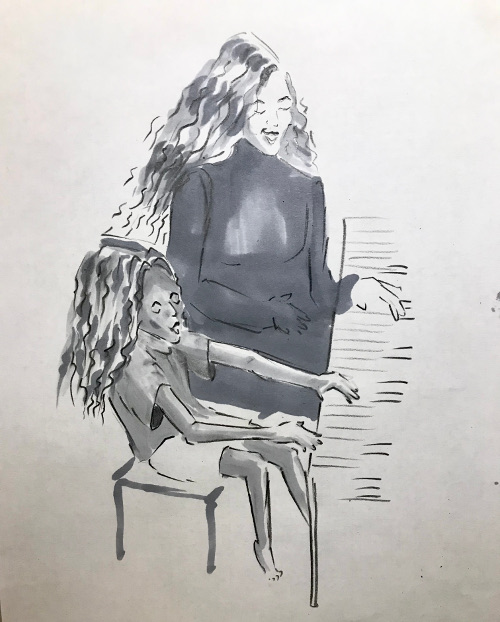
It’s mom and kid playing piano together.”
(Click to enlarge)
(Click to enlarge)
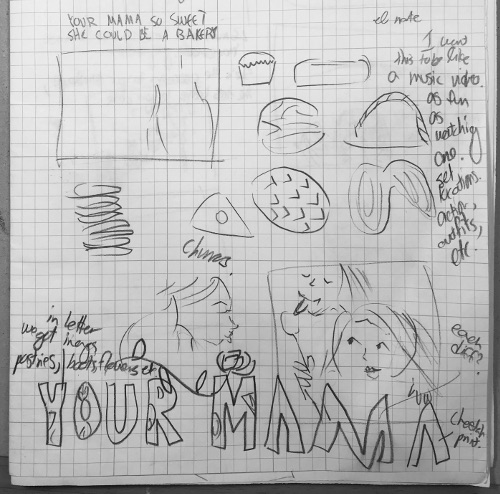
Also, I threw a simple rose drawing on top of the title that I was playing around with, which also got me thinking about incorporating roses. This fit in nicely,
once I landed on the vintage tattoo inspiration.”
(Click to enlarge)
Jules: How did you create these illustrations? Are these acrylics?
Jacqueline: Not acrylics! I start most illustrations with pencil and marker on paper (Prismacolor markers). I love using markers, especially for skin tones. Then I created different pastel backgrounds, aiming for the look and feel of tattoo flash art (a tattoo design printed on paper or cardboard). I collaged the pieces together in Photoshop and then used Procreate for the lettering and some other details and linework.
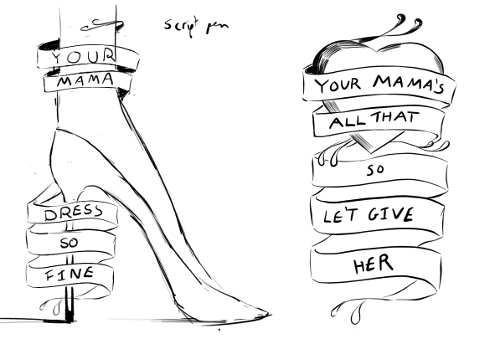
I was coming up with the idea of using banners. …”
(Click to enlarge)
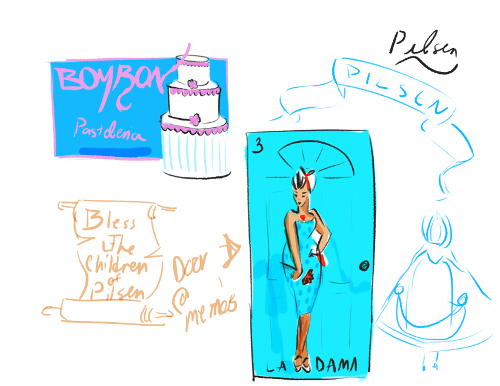
(Click to enlarge)
Jules: What was your favorite spread to work on?
Jacqueline: So many favorites! But I’ll have to go with “Your mamas all that, so let’s give her two snaps, a circle and a twist, mad dap a hug and a kiss.” I feel like I discover characters’ personalities through doing a lot of gesture drawing, and I knew these two were just dying to dance at some point!
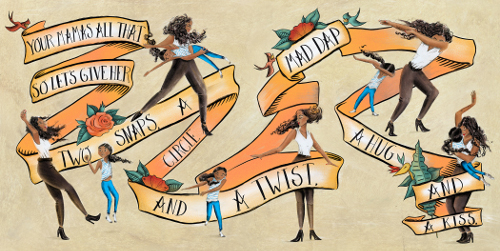
YOUR MAMA. Text copyright © 2021 by NoNieqa Ramos. Illustrations copyright © 2021 by Jacqueline Alcántara and reproduced by permission of the publisher, Houghton Mifflin Harcourt, Boston. All other images reproduced by permission of Jacqueline Alcántara.
Photo of Jacqueline Alcántara taken by Constance Kostrovski.
Photo of NoNieqa Ramos taken by Roger Hammons Photography.

HAHAHAH! I would not have imagined this as a book topic in my life but what a fun project!! And that last spread is just perfect – Two snaps, a circle and a twist… Mad dap, a hug, and a kiss.